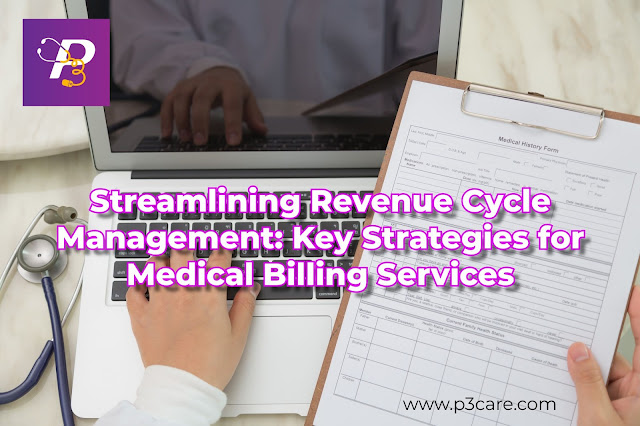Streamlining Revenue Cycle Management: Key Strategies for Medical Billing Services
In the complex landscape of healthcare in the United States, efficient revenue cycle management (RCM) is crucial for the financial health of medical practices. With the increasing focus on value-based care and regulatory requirements like MIPS reporting, medical billing services play a pivotal role in ensuring accurate reimbursement and compliance. In this article, we will explore the significance of RCM services and discuss key strategies for optimizing revenue cycles in the healthcare industry.
Understanding Revenue Cycle Management
Revenue cycle management encompasses the entire process of managing claims, payments, and revenue generation in healthcare organizations. It begins with patient scheduling and registration, followed by coding, claim submission, and payment posting, and ends with accounts receivable management. Effective RCM ensures that healthcare providers receive timely and accurate reimbursement for the services they deliver.
The Role of Medical Billing Services
Medical billing services providers play a crucial role in streamlining the revenue cycle for healthcare providers. These service providers are responsible for coding diagnoses and procedures, submitting claims to insurance companies or government payers, following up on unpaid claims, and managing denials and appeals. By outsourcing these tasks to specialized medical billing companies, healthcare practices can focus on delivering quality patient care while ensuring optimal revenue generation.
Key Strategies for Revenue Cycle Optimization
Comprehensive Revenue Cycle Assessment:
Conducting a thorough assessment of the revenue cycle process is the first step towards optimization. Identify bottlenecks, inefficiencies, and areas for improvement in patient registration, coding, claims submission, and payment posting.
Implementing Electronic Health Records (EHR) and Practice Management Systems:
Utilizing EHR and practice management systems can streamline various aspects of the revenue cycle, including patient data management, appointment scheduling, billing, and reporting. Integrated systems enhance efficiency, accuracy, and communication across different departments.
Compliance with Regulatory Requirements:
Staying compliant with regulatory requirements such as MIPS reporting is essential for maximizing reimbursement and avoiding penalties. Medical billing service providers should stay updated with the latest regulations and ensure accurate documentation and reporting of quality measures.
Coding Accuracy and Documentation Improvement:
Accurate medical coding is critical for proper reimbursement and compliance. Medical billing services should employ certified coders who are proficient in ICD-10, CPT, and HCPCS coding systems. Conduct regular coding audits and provide ongoing training to coding staff to improve accuracy and documentation.
Denial Management and Revenue Recovery:
Efficient denial management processes are essential for minimizing revenue loss and maximizing collections. Medical billing services should implement robust denial management strategies, including timely follow-up on denied claims, identification of root causes, and appeals management to recover lost revenue.
Patient Engagement and Financial Counseling:
Educating patients about their financial responsibilities, insurance coverage, and available payment options can improve upfront collections and reduce accounts receivable days. Provide transparent billing statements, offer payment plans, and utilize patient portals for easy access to billing information and communication.
Performance Monitoring and Reporting:
Implement key performance indicators (KPIs) and reporting mechanisms to track the effectiveness of revenue cycle management processes. Regularly monitor metrics such as days in accounts receivable, clean claim rate, denial rate, and net collection rate to identify areas for improvement and measure success.
Conclusion
Effective revenue cycle management is essential for the financial sustainability of healthcare organizations in the USA. Medical billing services providers play a crucial role in optimizing revenue cycles by streamlining processes, ensuring compliance, and maximizing reimbursement. By implementing key strategies such as comprehensive assessments, coding accuracy, denial management, and patient engagement, healthcare practices can achieve greater efficiency, profitability, and success in today's challenging healthcare environment.
Read more: Maximizing Revenue: Selecting the Best Medical Billing Service
P3 Healthcare Solutions Inc — Medical Billing Services and MIPS Consultants
Call us at +1 844–557–3227
Visit us:




Comments
Post a Comment